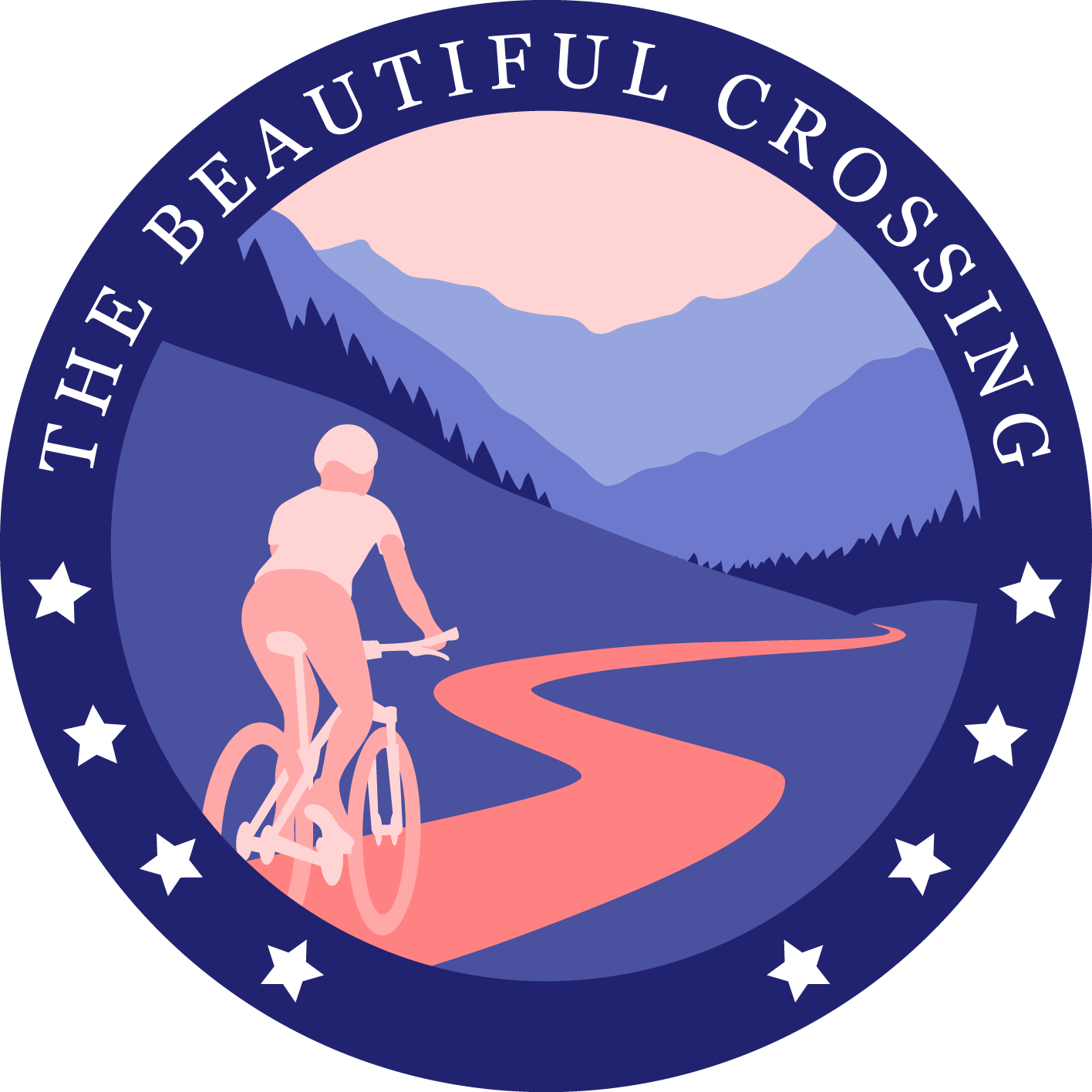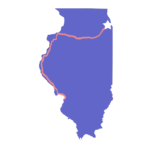
Illinois
AMMAR
CHICAGO, IL
“Before I moved to US, you know, I moved from Syria in 2012, and I moved with nothing. Nothing – no papers, no money, nothing. So when I moved to Istanbul, I got first – my first child, my son. After four years, I got my daughter. So my son and my daughter have no papers when we were in Istanbul. So I was like just, I’m looking to any papers for my children because if you have no papers, you have no future. Like in Turkey, I was trying to do like a bank account but they said, “No you cannot do that. You need a passport.” And the government in Syria, they don’t give us anything. If I go to the government in Syria, they going to took me to the jail.”
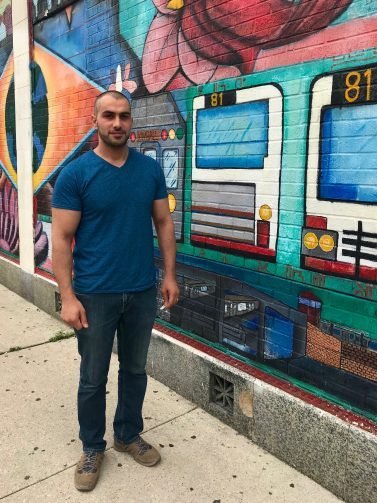
I’m from Syria. So in 2012 I moved to Turkey, Istanbul but after like two years we got call from United Nations and they asked us if we want to move to any country out of Turkey. So we said, “Yes.” This time it was like just you can say yes, or no you could not say I want to go to Canada, to Europe, to U.S. – it’s not your choice. Just you have to say yes. So we said, “Yes.” After one year – I think in 2015 – we got another call and they said, “You going to move to U.S.” So it was a lot of interviews. It’s like over them four, I think it was like five. So after that we moved to Chicago in 2017, like one year ago.
So when we moved to Chicago, you can say we moved from like another side of the world. So everything is different – the buses, the trains. You can see the people, the culture. And the first time when I ride the bus in Chicago, it was very – I don’t know! I got like some people from – like Hindu people, some people like as American people, some Mexican people. So we don’t have this stuff in our countries. So it was like can see all the world in one bus. So it was like very different for me, yeah.
When I start working here, it was like I had no idea about anything and it was no English. I don’t know how they hired me, but… Yeah, they accept me. It was like a good resume with me. So I have some experience for this work because I used to work as a security, so for like two years in Shabbah mall in my city, in Aleppo. It was like the biggest mall in Syria. So I used to do this stuff, maybe that’s why they hired me. But when I start working here, it was like I had no idea how they are going to pay for me. How much they going to pay for me. And after two weeks, they give me that first check, and I was like, “Oh my God, they give me like one check every month in my country!” So I was like that’s new for me, but I’m okay now. I know everything now about that – about jobs – about everything. I’m okay.
Before I moved to US, you know, I moved from Syria in 2012, and I moved with nothing. Nothing – no papers, no money, nothing. So when I moved to Istanbul, I got first – my first child, my son. After four years, I got my daughter. So my son and my daughter have no papers when we were in Istanbul. So I was like just, I’m looking to any papers for my children because if you have no papers, you have no future. Like in Turkey, I was trying to do like a bank account but they said, “No you cannot do that. You need a passport.” And the government in Syria, they don’t give us anything. If I go to the government in Syria, they going to took me to the jail. They going to take me to jail. So I was like I’m okay, I don’t need it. After that, I was like I’m trying to get to that driver’s license in Turkey. And they said, “No you cannot.” So it was like no you can’t do nothing. So we moved to here. Oh, it was like the biggest change in my life. So me, my wife, and my children – they got everything. Social security numbers, everything. IDs, everything, we have everything now. We can go to DMV and we can do everything so that’s great. Yeah. You feel like “Oh, I’m – I’m like the others, I’m not different.” You know? So that’s great, yeah.
I know at least 100 families in Turkey they have the same situation like me. They do all the interviews, they were ready to move to U.S., and they stopped them. So you can say, they waiting anyone to open the door for them. So I hope – I hope we can open this door again. I hope that.
In – when I was in Turkey with my family, all the time, when you say, “Oh, Chicago” – I was thinking about oh houses. That’s what I was like, I’m dreaming for that. So when we moved to here, we got small apartment – like one bedroom, and we have two children. So it’s like too tight! And we have like Maria, she’s like a troublemaker. So it’s like very, very tight home for us. So I don’t know, for the future I’d like to buy a small house in Chicago, and I hope I can do that in the future.
Thomas
Chicago, IL
“In the third year, I would say that still you are in that doubt but you think you can make it. But once you know, especially how to speak and the way that people communicate here, and when you break the culture barrier here – especially the culture barrier… For instance, when we speak back home to stare in the eye and speak, it’s rude. Especially if the person we are talking to is a little bit older. You cannot stare in their eyes. Here if you don’t look in the eyes when you speak, you are a lier. You have to speak louder. You have to walk faster. When you break those barriers, and when you come into that place, then you realize the benefits you have in here it is so huge.”
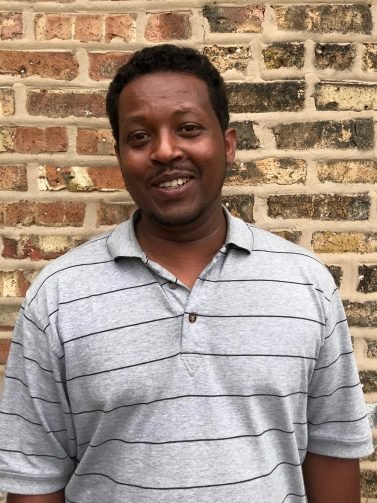
I am originally from East Africa, a small country called Eritrea. And I have been in the United States for the last 6 years.
Yeah, I do remember the first day I came and it feels like it happened yesterday. At least I feel it like it happened yesterday. It was was Nicole – her name – she is from Refugee One, the one that recieved me. And after she introduced herself and she said she’s my case manager. And she picked me up from the airport, and then it was summer when I came and its feels, when you go outside, it feels like you are still in the refugee camp. It is really hot. And I was like, “Are we still in the refugee camp?” And she laughed, and I laughed too. And we get into the car and she drove me to Sheridan and she said, “In fact your apartment is next to the lake.” And she said, “Let me show you to the lake.” And she took me to the lake. And I looked at the lake. It was beautiful. And I asked like, “Is this a lake?” And she said, “Yes, it’s a lake.” It doesn’t look like a lake, it’s really huge! And then she brought me back and she took me to my apartment. Honestly when I first came, it first feels as if I – when she first showed me my apartment – my bathroom, my shower, the kitchen, the refrigerator full of food! I mean that is something that makes you feel like you are a king, and happy. I was happy, and still am happy.
The first year, when you get back you are happy and think as if you are walking in the sky and then you realize the reality of life – you have to find a work. And then the things that are, that you have been receiving from the refugee agency, they start to be take away one by one. And then makes you feel like uncomfortable, and then finally you have to stand on your own two feet. So in this time, you have to face with some realities: the culture, the food, the language – you have to have at least a little bit of the language in order to cope up. So the first year was difficult.
The second year became better. I found a good family in the church, and then I found a good family in the church. The people are really nice. And I remember it was Thanksgiving, Ryan said let me take you to Michigan. I was like, “Are you sure want to take me to your family in Michigan?” He said, “Yes.” And he took me! We stayed there four days with his family: his father and mother, his brothers, his uncle, his aunt, and everybody. Then they accepted me and they welcomed me into their home. I cannot explain that feeling, and I am really really am proud of my church community. They are like the real help, and they make me feel – not they make me feel, they make sure that I am home.
In the third year, I would say that still you are in that doubt but you think you can make it. But once you know, especially how to speak and the way that people communicate here, and when you break the culture barrier here – especially the culture barrier… For instance, when we speak back home to stare in the eye and speak, it’s rude. Especially if the person we are talking to is a little bit older. You cannot stare in their eyes. Here if you don’t look in the eyes when you speak, you are a lier. You have to speak louder. You have to walk faster. When you break those barriers, and when you come into that place, then you realize the benefits you have in here it is so huge. Every morning I wake up and I say, “Thank you Lord.” And then I go to work. When I am done working, I come home. When I am feeling to go to any places, I can pick up and go. If I want to go to another state, I don’t have to worry about border crossings. I just pick up myself and go. See freedom is a beautiful thing.
I came from Ethiopia refugee camp. So I spent 7 years in Ethiopia, and before that also I was born in Ethiopia so I kind of know the language and a little bit of the culture, because Ethiopia is a vast country – there are a lot of cultures. And then I went to Eritrea and then also I lived in Eritrea. So I miss the language. Sometimes I miss to speak in Tigrinya. So I have to call a friend, “Um, I just miss to speak Tigrinya so I just want to speak to you in Tigrinya.” Or I just miss to speak Amharic, so I just call them. Then I miss the culture. There is a beautiful deep culture, especially when there is a wedding, or there is a funeral, or there is a gathering. I miss those. I miss the food. It’s called injera – the bread is called injera. I really miss it, and thank God we have a couple good restaurants here in Chicago so I go to some of them as often as I can.
Hafa
CHICAGO, IL
“In other countries that my brothers have been, it is very hard to change from a refugee to a permanent resident, or to a citizenship eventually. People will be refugee for the rest of their life, and they can’t get a passport so they can’t travel anywhere. They will just be stuck with that refugee status. But in here I have seen people come as refugees, you get a green card afterwards, you can become a citizen. Even for people who came over with different means, you eventually – there is the opportunity for you to be a part of this society and have the same opportunity.”
Photo Credit @joy.bittner
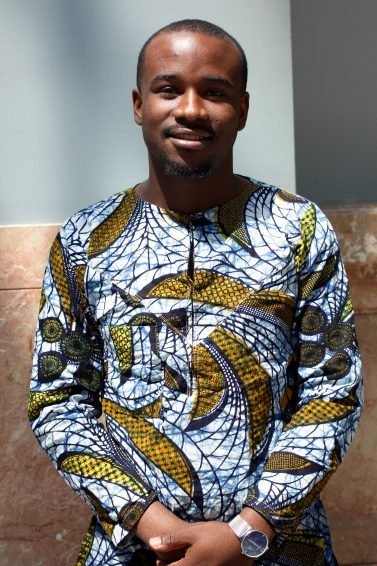
I’m from Tanzania. That’s where the refugee camp was. I was born in the Congo, and I have been in the States for about now 8 years. I will never forget my first day. I came here when it was cold and it was quite different. And especially we weren’t prepared for winter, so that made it a very memorable first day for us. But it was very welcoming at the same time too because we had people who came to pick us at the airport who we had never met before and they just came and got us and took us to our new home.
The other thing that was different – I wasn’t expecting too much – but how Americans are very obsessed with dogs. And literally everywhere you go you see the dog stores or dogs and everywhere and everything was almost about dogs.
There’s 12 of us in total. I have 9 brothers and 3 sisters. Only one of my sisters came to the States. She came with us, but she is married. And my other relatives are in Georgia and Tennessee, and some are still back home. Some are moving back from refugee camps to others, and some have gone to permanent place but they really can’t integrate because they haven’t given them any new status. They are still just refugees all the time.
There, people kind of bond. They have a saying that your neighbor is your family, and that your neighbor is your first (responsibility). I don’t, I don’t think that I have felt that as much in here. But I do have friends, but I don’t think that we are as close or we make as much time as people did back home. Because in here you have your neighbor who lives, for instance if you live in an apartment complex, you have your neighbor who lives above you or below you and you don’t even know them. For example, one time we asked our neighbor when they are usually home. And like, “Yeah, that’s none of your business. That’s my personal information. You don’t have a right to know.” And I was like, “Oh, okay – that’s fine.” But I have found that when we live with other refugees in the building, people just visit each other just like that. One time I was just sitting, shirtless in my house, and this lady came the back door and just took salt and walked out. And it was just kind of strange, a strange feeling – but it was a good feeling. She was from Burma, she was one of my Mom’s friends. And I asked my Mom and she said, “Yeah, we do the same thing. People just, if they need something very quickly, and it’s not worth of them going to the store, they just come by and grab it and go.” And yeah, that reminded me a of home a lot. The people do the same thing.
Relationship isn’t anything in here as much. Yeah, yeah, yeah – even I know that with my family is becoming like that too. Now Christmas is when it’s the family time. If it is not Christmas or one of the holidays, I barely see any of them.
In other countries that my brothers have been, it is very hard to change from a refugee to a permanent resident, or to a citizenship eventually. People will be refugee for the rest of their life, and they can’t get a passport so they can’t travel anywhere. They will just be stuck with that refugee status. But in here I have seen people come as refugees, you get a green card afterwards, you can become a citizen. Even for people who came over with different means, you eventually – there is the opportunity for you to be a part of this society and have the same opportunity. For instance, my brother has been in Malawi for over 20 years, but he is still a refugee and he can’t get a passport and he can’t have the same opportunity as other citizens. Because with his refugee card he can’t really work in many places, he doesn’t have many options. Yeah.
Tamana
Chicago, IL
“Right now I am very proud of myself because I am raising my kids and I am the only one working, and I have access to anything. There is nothing to stop me, like there is nothing for me to make an excuse, so I don’t have any excuse to stop me from growing. So I will use any opportunity to grow myself educationally and in the community.”
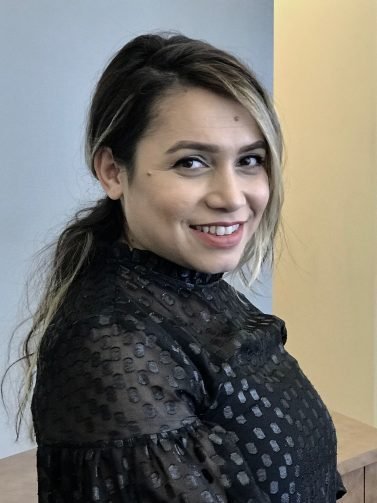
“I am originally from Afghanistan, yeah and we came from Pakistan because we lived there for two years until the United Nations got our paperwork done. Yeah, I have been here – this July would be twenty years.
I remember everything about my first day – it was so amazing! So we came to New York first, so one night we stayed there so they provide us with a hotel. So everybody, with two or three people in a room. So it was so amazing, and we couldn’t believe it that we were here because it was like a dream.
The first people that we met at the International Institute or when I went to school, most of them immigrants because at that time there were a lot of immigrants like I told you – Bosnians, Somalians. We made friends, and everyone was on the same page. Everybody was an immigrant, but our teachers and everybody at our school – they made us very welcome.
Right now I am very proud of myself because I am raising my kids and I am the only one working, and I have access to anything. There is nothing to stop me, like there is nothing for me to make an excuse, so I don’t have any excuse to stop me from growing. So I will use any opportunity to grow myself educationally and in the community.
Yeah, home is where you feel safe, where you feel you belong. But this country did give me that feeling of being safe and the feeling of belonging. So I never come across any racism, so far, thank God. But yeah, I really feel safe and belonging here, so this is where I call home now.”
Rubi
Chicago, IL
“I am from Sri Lanka. I came to Chicago one year and nine months ago. First thing, I am happy – my children have good education. Because before they didn’t study. So it was a little hard – my son is 13 years old before, and he never studied at school. So it is too hard for him…”
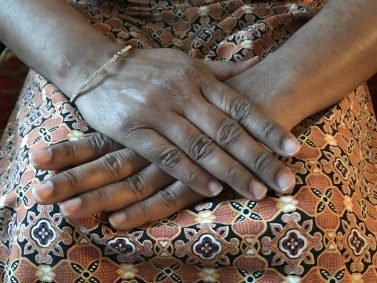
“I am from Sri Lanka. I came to Chicago one year and nine months ago. First thing, I am happy – my children have good education. Because before they didn’t study. So it was a little hard – my son is 13 years old before, and he never studied at school. So it is too hard for him.
I know that our life is gone, it is done, because our situation is too hard in our country. So we want to move outside from my country. We didn’t have too much money to pay for school because the government cannot allow for refugee people. So we can study in private, but it is too much money. So we don’t have money to give them to study in the private school, so we are teaching from our home. Whatever we know – we teaching that one! That is helpful for them to come to America to study. So someone is helping us in Malaysia even in Indonesia – someone is helping like until 2 or 3:30? So they are helping our children to study. So the first thing here – they can… good education. The have good education for my children.
One year we stay in the jail (detention center) in Indonesia. I learned more to understand English in the jail. They sent teachers. They bring the book – the basic. So I finished the four level books, so then I understand for reading. It is a little hard speaking English because that is not our language, so we never use English. Everything we use my language, Tamil. So that’s why it is a little hard for speaking English. But I can understand for reading – not 100% but before 25% I understand for reading and listening, hearing, everything.
I feel I can do everything now. Because before I don’t know everything – how to speak, how to manage everything. I was thinking, “Okay, how are we going to grow here?” Because everything is too hard – the listening, speaking. It is second language, but it is a little hard. It is not the same like my language. Now I understand 90%. I understand, like 50% I can speak. Whatever I can do now. I can manage everything. I don’t want to ask help from other person – school meetings or any type of problem, for our problem, or hospital. Everything is – I don’t need translator – I can do everything. So I am proud of… So I am happy for that one. It has been more than two years, so I think in four years I can speak 100%. I think.”
